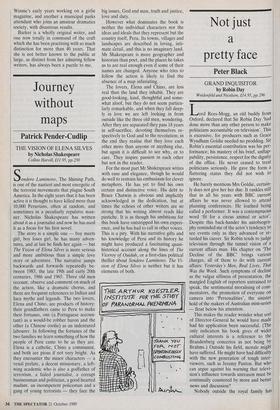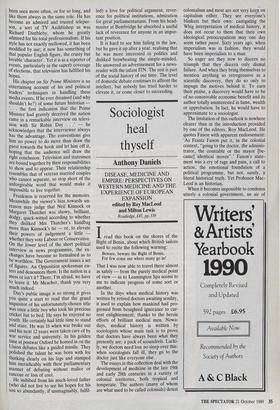Not just a pretty face
Peter Black
GRAND INQUISITOR by Robin Day
Weidenfeld and Nicolson, £14.95, pp.296 -wats■•■=ra
Lord Rees-Mogg, an old buddy from Oxford, declared that Sir Robin Day 'had done more than any other person to make politicians accountable on television'., This is excessive, for producers such as Grace Wyndham Goldie needed no prodding. Sir Robin's essential contribution was his per- formance; his mastery of his brief, unflap- pability, persistence, respect for the dignity of the office. He never ceased to treat politicians seriously. He gave the form a flattering status they did not wish to ignore.
He barely mentions Mrs Goldie, certain- ly does not give her her due. It rankles still that in all his years with BBC current affairs he was never allowed to attend planning conferences. He loathed being called a performer. It was a contemptuous word 'fit for a circus animal or actor'. Despite this back-hander his autobiogra- phy reminded me of the actor's tendency to see events only as they advanced or re- tarded his career. Sir Robin tends to judge television through the tunnel vision of a current affairs man. His chapter on 'The Decline of the BBC' brings various charges, all of them to do with current affairs: Yesterday's Men, Real Lives, That Was the Week. Such symptoms of decline as the vulgar silliness of presentation, the mangled English of reporters untrained to speak, the sentimental moralising of com- mentators, the promotion of everyone on camera into 'Personalities', the sinister hold of the makers of Australian mini-series — float below his attention.
This makes the reader wonder what sort of Director-General he would have made had his application been successful. (The only indication his hook gives of wider cultural interests is a reference to the Brandenberg concertos as not being by Brahms.) Outside his field, morale might have suffered. He might have had difficulty with the new generation of tough inter- viewers, such as Jeremy Paxton. But who can argue against his warning that televi- sion's influence towards unreason must be continually countered by more and better news and discussion?
Nobody outside the royal family has been seen more often, or for so long, and like them always in the same role. He has become an admired and trusted teleper- son, a sort of TV Archbishop as was Richard Dimbleby, whom he greatly admired for his total professionalism. If his style has not exactly mellowed, it has been modified by use; it now has something of that popular English figure, the crusty but lovable 'character'. Yet it is as a reporter of events, particularly in the superb coverage of elections, that television has fulfilled his hopes.
His chapter on Six Prime Ministers is an entertaining account of his and political leaders' techniques in handling these media events. If he ever dreamed (and why shouldn't he?) of some future historian `• • . the first indication that the Prime Minister had gravely deceived the nation came in a remarkable interview on televi- sion with Sir Robin Day — he acknowledges that the interviewee always has the advantage. The conventions give him no power to do more than draw the guest towards the hook and let him off it, hoping that the audience will draw the right conclusion. Television and statesmen are bound together by their responsibilities to show and to appear. Their relationship resembles that of veteran married couples who cannot separate, so stop short of the unforgivable word that would make it impossible to live together.
Frankness is reserved for the memoirs. Meanwhile the viewer's bias towards un- reason may judge that Neil Kinnock or Margaret Thatcher was showy, brilliant, dodgy, quick-witted according to whether they disliked Mrs Thatcher's handbag more than Kinnock's tie — or, to elevate their powers of judgement a little whether they vote Labour or Conservative. On the lower level of the short political interview in news programmes, the ex- changes have become so formalised as to be worthless. The Government issues a set of figures. An Opposition spokesman en- ters and denounces them. Is the nation in a mess or isn't it? There, I'm afraid, we have to leave it. Mr Meacher, thank you very much indeed.
Day's public image is so strong it gives you quite a start to read that the grand inquisitor of his unfortunately-chosen title was once a little boy who took his precious cricket bat to bed. He says he enjoyed no youth. He certainly had little time to stand and stare. He was 16 when war broke out and his next 12 years were taken care of by War service and university. In his golden time at postwar Oxford he homed in on the Union debates like a guided missile. They polished the talent he was born with for thinking clearly on his legs and stamped him ineradicably with their parliamentary manner of debating without malice or rancour or loss of cool.
He imbibed from his much-loved father (who did not live to see his hopes for his son so abundantly, if unimaginably, fulfil- led) a love for political argument, rever- ence for political institutions, admiration for great parliamentarians. From his head- master at Bembridge he absorbed a useful lack of reverence for anyone in an impor- tant position.
It is hard to see him failing in the law, but he gave it up after a year, realising that he was more interested in politics and disliked browbeating the simple-minded. He answered an advertisement for a news- reader with the infant ITN. The rest is part of the social history of our time. The level of domestic debate continues to affront the intellect, but nobody has tried harder to elevate it, or come closer to succeeding.



























































 Previous page
Previous page